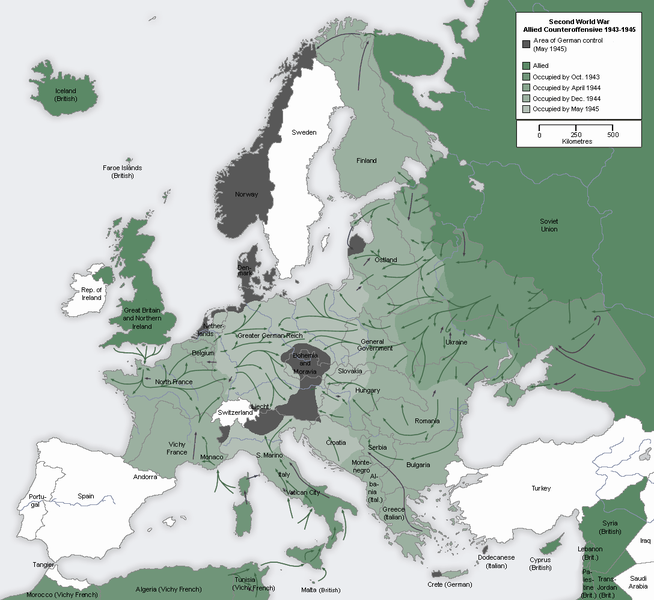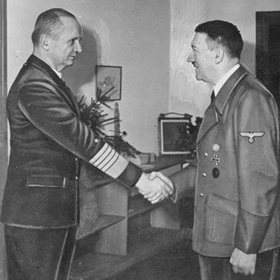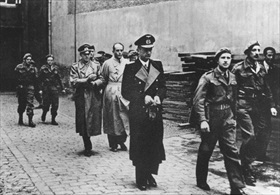EISENHOWER DISSOLVES NAZI GOVERNMENT
Muerwik, near Flensburg, Northern Germany · May 23, 1945
On this date in 1945, twenty-three days after Adolf Hitler’s suicide under the rubble of the Reich capital, Berlin, and sixteen days after emissaries from Grand Admiral Karl Doenitz’s government agreed to the unconditional surrender of all German military forces, a British liaison officer went to Doenitz’s headquarters at the Muerwik naval academy in Flensburg. He asked to speak with the admiral and members of his government. He then read an order from Gen. Dwight D. Eisenhower, Supreme Commander Allied Expeditionary Force, ordering the dissolution of Doenitz’s Nazi government and the arrest of all its cabinet members.
Doenitz & Co. had hoped the Allies would recognize their government as the provisional government of postwar Germany, but the Soviets would have nothing to do with the “Fascist gang around Doenitz.” Interestingly, although the German armed forces had surrendered unconditionally in Reims, France, on May 7, 1945, and in Berlin the next day, the civilian government Hitler had invoked into being in his political testament (i.e., the Doenitz government) had not been included in the German Instrument of Surrender. The “Act of Military Surrender,” the document that Chief of Operations Staff of the Wehrmacht Col. Gen. Alfred Jodl signed, stated only that “All forces under German control [were] to cease active operations at 23:01 hours Central European Time on 8 May 1945.”
The power vacuum that ensued between the arrest of Doenitz and his cabinet ministers and the dissolution of the Third Reich ended on June 5, 1945, when Allied representatives signed a four-power document, the Declaration Regarding the Defeat of Germany, which formally abolished any German governance over the vanquished nation. Although Germany continued to exist, the country was placed under the authority of the Allied Military Occupation Government, whose supreme authority was discharged by the Four Powers jointly for all four occupation zones (U.S., Soviet, British, and French) via the Allied Control Council based in Berlin.
The ACC—pretty much a toothless body because all decisions were made by consensus, of which there was practically none—ceased operations in March 1948, its functions in Western Germany turned over to the Allied High Commission until the West German Federal Republic gained sovereignty in 1949. The Soviet occupation zone (Eastern Germany) was administered by a High Commissioner until the German Democratic Republic gained sovereignty the same year.
Grand Admiral Karl Doenitz’s Flensburg Government, May 2–23, 1945
 |
Above: Map showing extent of Flensburg Government control (dark grey), May 2–23, 1945. Headed by Grand Admiral Karl Doenitz, the Flensburg Government had de jure but little if any de facto control over the remnants of the Third Reich, and none over the areas shown in shades of green. The short-lived Flensburg Government, named after Doenitz’s headquarters on the Schleswig-Holstein coast, attempted to rule the country following Hitler’s suicide (a “hero’s death,” Doenitz called it). The Flensburg Government was dissolved by order of Gen. Dwight D. Eisenhower.
 |  |
Left: Hitler receives Doenitz in late December 1944 or early 1945. Shortly before the military and political collapse of Nazi Germany and his suicide on April 30, 1945, Hitler transferred the leadership of the German state to the Admiral. Doenitz did not become Fuehrer (a post Hitler abolished in his political testament), but rather President (Reichspraesident). Propaganda Minister Joseph Goebbels would have become Chancellor (Reichskanzler) but for his own suicide hours after Hitler’s.
![]()
Right: Three members of the Flensburg Government—Doenitz (dark coat), Reich President and Minister of War; trailing him Col. Gen. Alfred Jodl, Doenitz’s delegate who signed for the Oberkommando der Wehrmacht at Reims, France; and to Jodl’s left (in civilian attire) Albert Speer, Minister for Economics—following their arrest by British Royal Hussars carrying out Operation Blackout, May 23, 1945. Shortly after the men were taken into custody, Flensburg’s main street swarmed with British tanks and troops rounding up the remaining members of Doenitz’s administration and staff. In all, between 5,000 and 6,000 Germans, including hundreds of high-ranking military officers, were taken into custody. Doenitz, Jodl, and Speer were tried by the four-power International Military Tribunal in Nuremberg (November 20, 1945, to October 1, 1946). Jodl was executed as a war criminal, and Doenitz and Speer served prison terms of 10 and 20 years, respectively.
Contemporary Newsreel Account of Arrest of Flensburg (Doenitz) Regime Members
![]()

 History buffs, there is good news! The Daily Chronicles of World War II is now available as an ebook for $4.99 on Amazon.com. Containing a year’s worth of dated entries from this website, the ebook brings the story of this tumultuous era to life in a compelling, authoritative, and succinct manner. Featuring inventive navigation aids, the ebook enables readers to instantly move forward or backward by month and date to different dated entries. Simple and elegant! Click
History buffs, there is good news! The Daily Chronicles of World War II is now available as an ebook for $4.99 on Amazon.com. Containing a year’s worth of dated entries from this website, the ebook brings the story of this tumultuous era to life in a compelling, authoritative, and succinct manner. Featuring inventive navigation aids, the ebook enables readers to instantly move forward or backward by month and date to different dated entries. Simple and elegant! Click 











